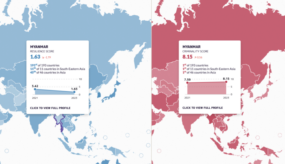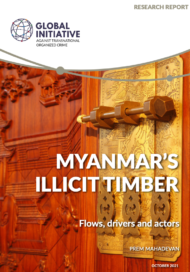Posted on 27 Aug 2025
The Wang Xing incident – where a Chinese influencer was trafficked into and held hostage in multiple scam compounds on the Myanmar–Thailand border in early 2025 – attracted widespread attention in China, Thailand and beyond. Chinese crime groups operating out of Myanmar managed to infiltrate Wang Xing’s social network and eventually recruited him for what appeared to be a legitimate role in a film production.
After he went missing near the Myanmar border, Wang’s girlfriend used her contacts with Chinese celebrities to spread awareness of his plight across the Chinese-speaking world. This prompted a forceful response by the Chinese police, which deployed senior officials to Myanmar and Thailand to facilitate his rescue. Momentarily, there was mounting international pressure for action against cyber scams, raising the hope of an effective response to this regional illicit industry.
China’s response was crafted with two objectives in mind: to generate the media coverage needed to respond to domestic pressure triggered by trafficking and scamming of Chinese nationals, and to instrumentalize the incident to extract political and economic concessions from Thailand. Both objectives were secured by March. Chinese state media widely reported the involvement of the Chinese police in the rescue and repatriation of Wang Xing, and the subsequent repatriation of over 5 000 other Chinese nationals through Thailand. Meanwhile, Chinese narratives regarding public safety in Thailand gave China leverage over Thailand on critical bilateral issues, including the repatriation of Uyghur refugees, the placement of Chinese police in the border city of Mae Sot and deepening cooperation around the Global Security Initiative.
Thailand, for its part, implemented efforts to cull scam centres in Myawaddy by cutting off access to electricity, internet and fuel. Thai police attempted, but in the end failed, to obtain an arrest warrant for the leader of the Myanmar military’s Border Guard Force (BGF), Chit Thu. The BGF is the primary partner and security umbrella for Chinese illicit businesses in the Myanmar–Thailand borderlands, and actions targeting Chit Thu would significantly threaten the illicit activities.
Weathering a crisis
The BGF (also known as the Karen National Army) and the Democratic Karen Benevolent Army (DKBA), ethnic militia groups that control border areas around Myawaddy town, partner with Chinese mafia groups to operate some 40 scam compounds along a 200-kilometre stretch of the Myanmar–Thailand border. With the scam centres under their control hosting between 50 000 and 100 000 people, these armed groups exploit the Myanmar military’s dependencies on them to ensure its ongoing complicity in and protection of the criminal activity.
As such, for both militias the greatest threats to their operations are not domestic but from Thailand and China. Their response to the Wang Xing incident shows how they have managed to insulate their activities from cross-border crackdowns and opportunistically take advantage.
The BGF and DKBA quickly mobilized following the Wang Xing incident, transferring about 10 per cent of the people held inside the scam compounds to detention facilities to await repatriation. An arrangement was made whereby those who were released would cross into Thailand after the Myanmar military had notified the Thai government, and only after a representative of the home country had agreed to meet them at the border to facilitate their return home. Several thousand people from 38 countries were then forced to wait in detention while the Thai authorities struggled to manage a global coordination effort. In the process, the DKBA and BGF scored reputational wins, boasting about their ‘rescues’ and diverting attention to failures of countries to repatriate their stranded nationals. This was happening as most of their victims remained trapped inside scam centres, and as new victims were forced to work in them.
On 28 March, a 7.7 magnitude earthquake struck Myanmar, displacing hundreds of thousands of people, and refocusing international attention on a looming humanitarian crisis. While they had kept a low profile since the Wang Xing incident, the earthquake offered the scam centres the opportunity needed to achieve a reset in operations. In Shwe Kokko, they launched a new VIP attraction – a park offering wealthy Chinese nationals the opportunity to play war games with armed Chinese security personnel using automatic weapons. The opening of the park and the influx of moneyed Chinese nationals across the border demonstrated the ability of the crime groups to overcome restrictions on their cross-border activities.
Another challenge arose when Thai authorities cut exports of the fuel needed to operate the generators in Myawaddy that the scam centres had become increasingly reliant on following Thailand’s earlier move to sever cross-border access to electricity. In response, the militias and their scam syndicates cornered the domestic fuel industry. Within weeks, local communities in Karen, Mon and Shan State saw a spike in fuel prices as resources were drained from the market. Thailand was immediately pressed to resume exports to bring prices down.
The scam empire adapts
Today, as efforts to address the criminality surrounding the scam compounds flounder, the crisis continues. There is growing evidence of a hierarchy of scam compounds, with some specializing in more sophisticated forms of scamming and employing veteran scammers, money laundering services and grey area online gambling operations. Others meanwhile indoctrinate and prepare new recruits, or host newly established scam syndicates. Shwe Kokko is emerging as an upscale location for scam syndicates, is now equipped with its own Huione-style financial service provider and has the largest concentration of entertainment facilities, including nightclubs and other venues. Meanwhile, the scam centre Taichang Park is reportedly known for torturing new victims or extorting ransom payments.
New patterns are also emerging in human trafficking. Scam syndicates are intentionally targeting individuals from countries that have limited diplomatic or consular resources. For example, so far this year over 700 Ethiopian nationals were brought out of scam syndicates in Myawaddy. It took Thailand months to elicit a response from Ethiopian officials.
Kidnapping for ransom tied to scam centres is emerging as a secondary market, focusing on Chinese nationals, but with the prospect of extending to targets in other countries. This has been made possible by the emergence of a cottage ‘rescue industry’, which involves Chinese nationals with close ties to the Myanmar armed groups or key figures in the Chinese mafia serving as intermediaries between these groups and family members of victims. It is estimated that so far in 2025, more than 100 Chinese families have each paid so-called extraction fees of US$30 000–50 000 to have family members released.
Finally, as scam centres bordering China and Thailand face rising international scrutiny, operators have begun moving them to more remote locations. In Shan and Karen states, access to better-quality satellite internet services and solar energy has enabled them to relocate 100–200 kilometres from the border.
Wang Xing 2.0
The case of Zhong Haobin, a 25-year-old model who was trafficked to Myawaddy in June 2025 exactly the same way as Wang Xing revealed the extent to which the crackdowns had failed. Although China managed to extract Zhong promptly, its response this time was notably muted. Meanwhile, an ongoing political crisis in Thailand and military conflict with Cambodia meant that Myanmar’s scam compounds were off the radar and would not face further challenges.
Bolder action will be needed to achieve any meaningful disruption to Myanmar’s scam empire. First, international actors, and particularly frontline states like Thailand, need to shift from targeting individual compounds or countries to focus on the broader criminal networks involved. For Thailand, this will involve tackling the problem on all its borders at the same time. The current approach, which pivots from Myanmar to Laos to Cambodia, results in criminals hop-scotching across borders and diversifying operations across geographies.
Secondly, this problem is global – over 40 countries were involved in addressing just the human trafficking element of the crisis in Myawaddy. To disrupt vested interests operating along the border, and to proactively manage the global aspects of the problem, it is essential that states scale up their cooperation. One immediate step might be for countries experiencing significant losses to establish a multi-country task force involving law enforcement and consular affairs that can be deployed along borders. Such a group could be tasked with monitoring trends, gathering intelligence from victims and facilitating repatriations.
Finally, sanctions on the criminal actors and militias involved have been used too sparingly. While in May the US sanctioned the Karen National Army as a transnational criminal organization, the majority of the armed groups and Chinese mafia leaders involved have yet to be sanctioned.



